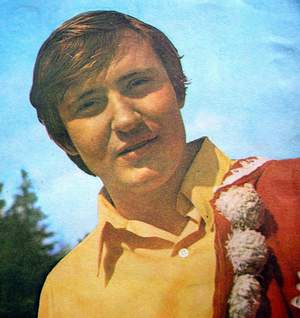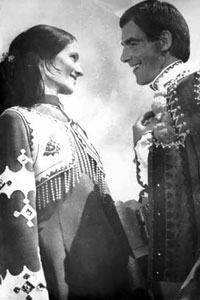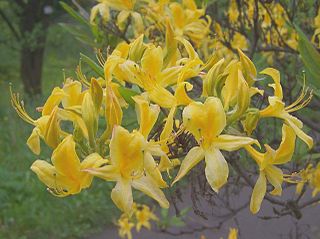
Sofiia Mykhailivna Yevdokymenko-Rotaru, known as Sofia Rotaru, is a Ukrainian pop singer of Romanian origin.

Ukrainian rock is rock music from Ukraine.

TNMK or Tanok na Maidani Kongo - is the most successful Ukrainian hip-hop group. They are known for clever, yet often tongue-in-cheek, lyrics; mixing hip-hop with rock, funk and jazz music and playing real instruments on their albums and live shows, rather than using samples and drum machines. TNMK performed at many festivals as: Sziget Fest, Zakhid, Tavria Games, Chervona Ruta, Faine Misto and Bandershtat.

Volodymyr Mykhailovych Ivasyuk or Volodymyr Ivasiuk was a Ukrainian songwriter, composer and poet. He is the author and composer of the widely popular song "Chervona Ruta" popularized by Sofia Rotaru in 1971, and later covered by other singers.
"Chervona Ruta" is a popular Ukrainian song written by Volodymyr Ivasyuk in 1968 and performed by many singers. The song was never formally copyrighted and due to its wide popularity is considered a Ukrainian folk song. It is named after a mythological flower, the chervona ruta, which if found turning a red colour by a young girl, was meant to bring happiness in love.
Pop music in Ukraine is Western influenced pop music in its various forms that has been growing in popularity in Ukraine since the 1960s.

Chervona Ruta is a 1971 Soviet Ukrainian musical film written by Miroslav Skochilyas and directed by Roman Oleksiv, starring Sofia Rotaru and Vasyl Zinkevych alongside popular Soviet Ukrainian ensembles.

Where Has Love Gone? is a 1980 Soviet musical drama film written and directed by Valeriu Gagiu starring Sofia Rotaru as well as Valeriu Gagiu and Evgueny Menishov. The movie features songs performed by Sofia Rotaru, sequence of substantial dialogues. The setting includes Moldavian landscape and countryside life as well as Black Sea coast, Chişinău and Odessa.
Monologue of Love is a Soviet Ukrainian musical telefilm, written by Grigore Vieru and directed by Larisa Maslyuk, starring Sofia Rotaru in the main role. The movie filmed at Ukretelefilm in Crimea, Kazakh SSR and Lithuanian SSR, features the new conception in the Soviet musical telefilms: substantial poetry monologues recited by Sofia Rotaru on themes associated with love, followed by thematic songs and corresponding natural geographical and theatrical scenic setting.
The discography of Sofia Rotaru.

Chervona ruta (Monarda) may refer to a mythological or actual species of flowering plants in the rue genus of the citrus family, Rutaceae, or the rhododendron genus of the heath family, Ericaceae.

Vasyl Ivanovych Zinkevych is a Soviet and Ukrainian singer, actor, dancer and costume designer. Alongside Nazariy Yaremchuk, Sofia Rotaru and Volodymyr Ivasyuk, Zinkevych was one of the faces of the Ukrainian roots revival music of the 1970s.

Sofia Rotaru, also known as Ballad of Violins is the second album by Soviet singer-songwriter Sofia Rotaru, released in 1974 by Melodiya. The album includes songs performed in Russian, Ukrainian, Bulgarian and Romanian languages.

Chervona Ruta was a Ukrainian music group that performed between 1971 and 1990. Chervona Ruta group was created in 1971 by Anatoliy Evdokimenko with the Chernivtsi Philharmonic specially for the accompaniment of Sofia Rotaru. The founding members of the group were part of the pop orchestra of the Chernivtsi University.
"L'immensità" is an Italian song, which was first performed by Johnny Dorelli and Don Backy in 1967 and became 9th at the Sanremo Song Contest. This is one Johnny Dorelli's signature songs, entering for several weeks in the Italian charts.
Anatoliy Kyrylovych Yevdokymenko was a Ukrainian musician, director of Chervona Ruta. He is a People's Artist of Ukraine, husband of Sofia Rotaru.

Monologue of Love, sometimes called Monologue about Love is the studio album by Soviet singer Sofia Rotaru, released in 1987 by Melodiya. The long play album was simultaneously released for the Soviet and international market. The album includes songs performed in Russian with new rock style arrangements by leading Soviet pop and rock bands: Vesyolye Rebyata, Forum, Chervona Ruta. This album is a soundtrack album to the movie Monologue of Love released in 1986.

Sofia Rotaru and Chervona Ruta is a 1981 studio album by Sofia Rotaru, recorded at Melodiya in the USSR. It is packaged together with Where Has Love Gone?, the film soundtrack for Where Has Love Gone?.
Chervona Ruta is a permanent biennial all-Ukrainian youth festival of contemporary song and popular music, which has been held every two years since 1989. It was a benchmark where more Ukrainian popular music was presented transitioning away from traditional Ukrainian folk culture associated with "sharovary" genre. Unlike the Soviet festival Song of the Year where only a selected song from Ukraine sometimes was demonstrated, Chervona Ruta allowed more singers and songs.
"Kray, miy ridniy kray" is a song originally recorded by Sofia Rotaru for her 1981 album Sofia Rotaru and Chervona Ruta.











